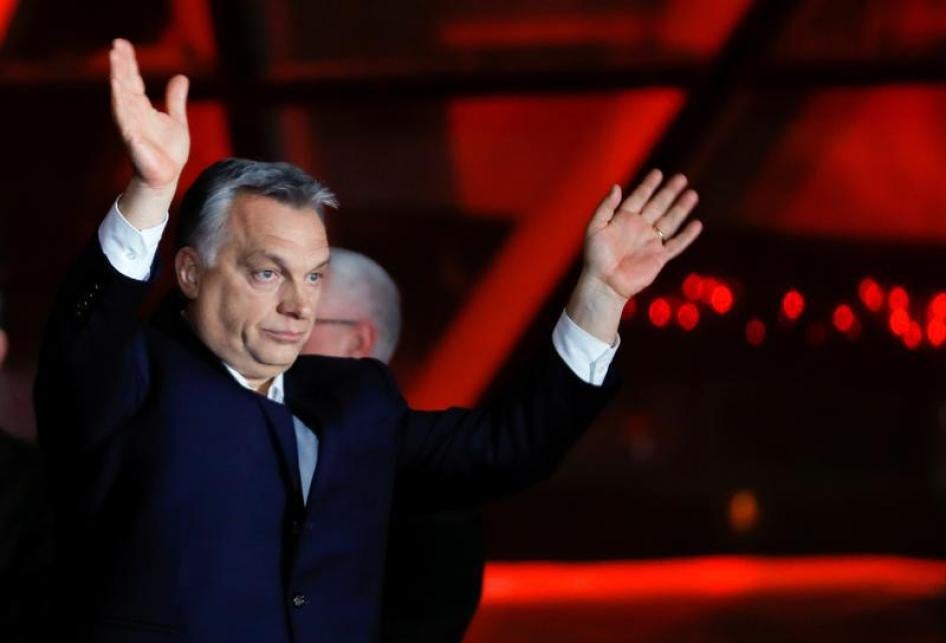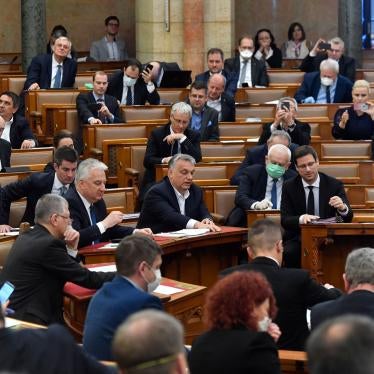The good news is that the German government has indicated that protecting the rule of law will be among its top priorities during its European Union presidency. In her address to the German Parliament on June 18, Chancellor Angela Merkel underlined that authoritarian leaders had used Covid-19 to “harm people’s dignity [and] undermine people's human rights…. This is something we need to stand up against.”
Viktor Orbán of Hungary is one of them. Over the past 10 years, the Orbán government has spared no effort to criminalize civil society activities, weaken the judiciary, and strengthen its control over the media. For years, Europe’s response to Hungary’s crackdown has been muted. Key EU leaders favored a more kid-gloves approach, hoping that Orbán would get back on track. Even after the European Parliament, in September 2018, opened the Article 7 procedure against Hungary, which can lead to sanctions against EU members that don’t respect EU values, the EU Council dragged its feet instead of increasing pressure.
We should acknowledge now it was the wrong strategy. Here is what the German government should do now.
First, it should put its full weight behind the Article 7 procedure. We often hear that the procedure is weak. It is not weak in a vacuum, but because Germany and others have not shown enough courage to make the best use of it. Germany should start mobilizing partners in Europe to take the process forward. The next step - to determine that there is a “clear risk of serious breach” of EU values - requires a four-fifths vote by EU member states, which, with stronger mobilization, is attainable.
Second, Orbán needs to know that he will pay a price for dismantling democracy. To her credit, Chancellor Merkel has on a number of occasions uttered her concerns about the rule of law in Hungary. But German leaders should refuse to roll out the red carpet for Orbán. If meetings are unavoidable, the rule of law should be on the agenda.
Third, Germany should put on the table what would affect Orbán the most: reducing his access to certain European funds, given increasing concerns about how the Hungarian government uses EU money. In fact, Hungary received twice as much money, no strings attached, as Italy from the EU Commission to respond to Covid-19, even though it is far less affected by the pandemic.
During its EU presidency, Germany should prioritize creating an entity to review EU subsidies with the possibility of reducing them if there is a risk they could be diverted from their objectives due to the democratic deficit. Suspending funds should also be an option when there are attempts to stymie the work of independent media and civil society groups, which play an essential role in monitoring governments’ use of the funding. This can be achieved subject to a human rights impact assessment to ensure that cutting funding will not harm the general population.
Finally, CDU and CSU should revoke their partnership with Orbán’s Fidesz in the European People’s Party. Fidesz’s presence in the party has helped protect Orbán and his excesses rather than the values the party is supposed to defend. But despite the principled statements by some CDU and CSU leaders, the two German parties have failed to join a call by 13 other EPP members to expel Fidesz from the European platform.
Germany’s EU presidency is an important moment for the future of Europe. Taking serious action to defend democracy and the rule of law everywhere in the Union is central to that effort.









